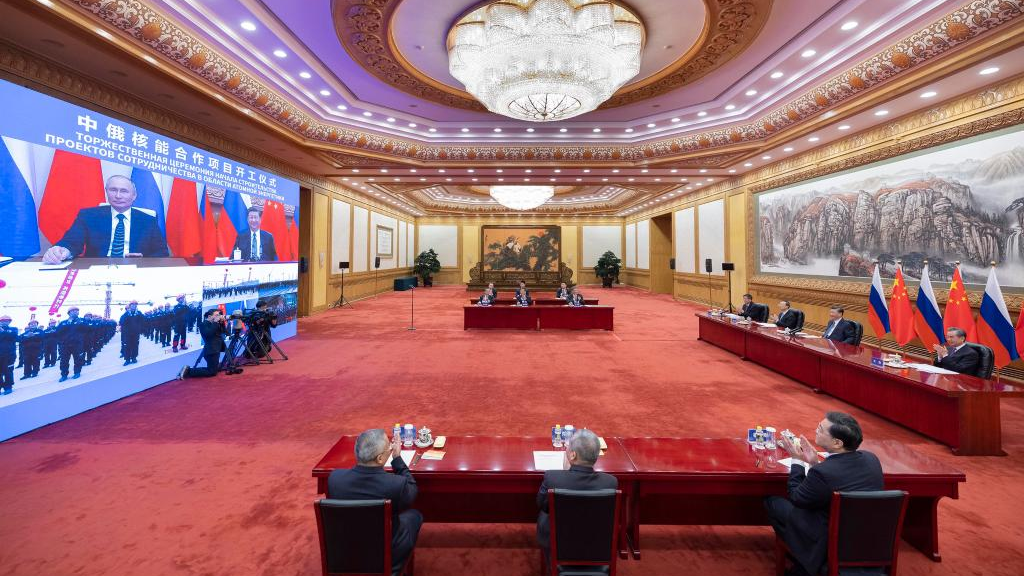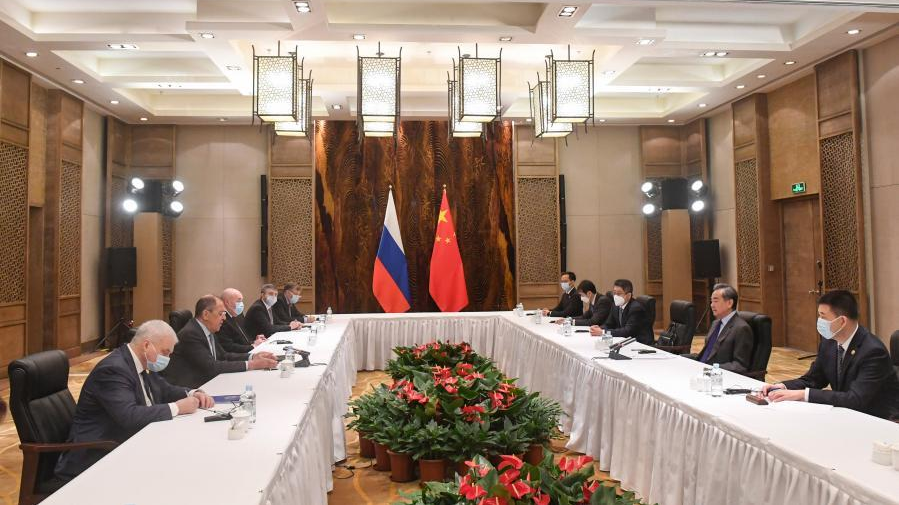
Chinese President Xi Jinping and Russian counterpart Vladimir Putin witness the ground-breaking ceremony of a bilateral nuclear energy cooperation project via video link in Beijing, May 19, 2021. /Xinhua
Chinese President Xi Jinping and Russian counterpart Vladimir Putin witness the ground-breaking ceremony of a bilateral nuclear energy cooperation project via video link in Beijing, May 19, 2021. /Xinhua
Editor's note: Danil Bochkov is an expert with the Russian International Affairs Council. He graduated cum laude with a master's degree in economics from MGIMO-University under the Ministry of Foreign Affairs of Russia and a master's degree in world economy from the University of International Business and Economics in China. The article reflects the author's opinions and not necessarily the views of CGTN.
Yang Jiechi, a member of the Political Bureau of the Communist Party of China (CPC) Central Committee and director of the Office of the Foreign Affairs Commission of the CPC Central Committee, is visiting Moscow for security and strategic talks. Mr. Yang is sitting down with his Russian counterpart Nikolai Patrushev, serving as the Secretary of the Security Council of the Russian Federation – a state body with constitutional status, which currently plays a very influential role in Russian politics and the top-level decision-making process.
Both officials haven't had a face-to-face communication since their last rendezvous happened in December last year in Shanghai. A lot of crucial development on the global stage has occurred, meaning that Mr. Yang and Mr. Patrushev have a very extensive agenda for the discussion. Global media has been debating over the likeliest topics to be brought to the table.
China's Global Times stressed that Russia-China "strategic cooperation … will … have a great global significance" and insisted that the talks would encompass COVID-19 pandemic, situation in Afghanistan, Palestine-Israeli peace-process and cooperation in nuclear energy and space. All those topics are truly important for bilateral interaction of Moscow and Beijing. They address the most pressing issues of mutual concern – be it intensification of conflicts in the regions with huge political and economic interests of both states or the collaboration in the most advanced domains of today's Research and Development (R&D).
The Middle East is strategically important for Russia as the guarantor of the stability of the country's Caucasus region and nonproliferation of the extremist ideology there, whereas for China – it is the main supplier of oil and a territory with huge potential for the rollout of flagship Belt and Road Initiative with many regional countries already signed up for it.
Cooperation in space research has been prioritized by both states being present in most documents following highest-level meetings. In 2019, Chinese President Xi Jinping met his Russian counterpart Vladimir Putin several times with space cooperation listed in the joint papers aftermath June and November summits, among other projects prioritized for further strengthening of collaboration.
Nuclear energy cooperation has also been an area of strategic interaction of both states over the recent years depicting deep trust enjoyed by both sides. When witnessing the recent "ground-breaking ceremony" marking the commencement of the construction new nuclear reactors in Tianwan and Xudapu nuclear power plants, President Xi stressed that effective cooperation of China and Russia in unprecedentedly tense times of the pandemic is "a vivid demonstration of the China-Russia comprehensive strategic partnership…"

Chinese State Councilor and Foreign Minister Wang Yi (2nd R) meets with Russian Foreign Minister Sergei Lavrov (2nd L) in the city of Guilin, south China's Guangxi Zhuang Autonomous Region, March 23, 2021. /Xinhua
Chinese State Councilor and Foreign Minister Wang Yi (2nd R) meets with Russian Foreign Minister Sergei Lavrov (2nd L) in the city of Guilin, south China's Guangxi Zhuang Autonomous Region, March 23, 2021. /Xinhua
China's leader also highlighted energy cooperation as one of the most important areas of practical cooperation, which meshes with President Putin's remarks about the use of nuclear energy as a "significant part of the comprehensive strategic partnership."
Russian media expected both sides to explore more opportunities during the meeting following extension of the China-Russian Treaty of Good Neighborliness and Friendly Cooperation this year, which was also hailed by both states' presidents during the recent ceremony of the China-Russia nuclear energy cooperation project.
The degrading relations of both states with the West, namely the U.S., have been dominating Russia-China interactions over the recent time. During countries' foreign ministers meeting held in March, Russian Foreign Minister Sergei Lavrov and State Councilor and Foreign Minister Wang Yi exchanged developments of Moscow and Beijing relations with Washington and called on the U.S. "to reflect on the damage it has done to global peace…, halt unilateral bullying."
Meeting Nikolai Patrushev in December 2019, Xi also stressed that the U.S. "increased … interference in the internal affairs of China and Russia …, posing threats to the two countries' sovereignty." Russian official replied – "Russia-China relations are solid and unbreakable."
It seems that nowadays, with more solidified U.S. pressure on China branded as "greatest threat" and Russia reprimanded for "harmful foreign activities" as well as following the recent introduction of a batch of sanctions against Moscow and Beijing, such a description of steadfast Russia-China bilateral relations becomes even more accurate.
Yang Jiechi's visit to Moscow reaffirms the regularity of Russia-China contacts on all levels and political structures, which looks unprecedented if compared against nearly zero contacts of Moscow and Beijing with Western states.
Intensive exchanges have been going between foreign ministers of Russia and China, who met in March and countries' presidents who have just wrapped up a video call giving a start to new nuclear energy project and are supposed to meet soonest. Other top officials also come to contacts via inter-parliamentary cooperation such as April's dialogue between United Russia and the Communist Party of China.
As President Putin has recently said, "Russia-China relations reach the best level in history." Now Moscow and Beijing will be busy buttressing this state of relations against all the odds of global political turbulence.
The best way to do so is by pursuing trust-based cooperation via constant and immediate interaction of top political brass and gradual expansion of new cooperative areas. Yang Jiechi's visit is aimed at maximizing exactly this goal and reassuring Russia-China deepening cooperation.
(If you want to contribute and have specific expertise, please contact us at opinions@cgtn.com.)

